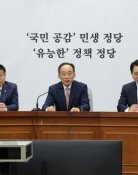[Editorial] If Govt and Politics Change, People Will Change
[Editorial] If Govt and Politics Change, People Will Change
Posted April. 30, 2008 06:23,
President Lee Myung-bak is said to have a great fondness for the New Village Movement program of the 1970s. That is because he, as a front-line worker at the time, learned that the movement laid the spiritual foundation of industrialization and modernization that created something from nothing.
President Lee made a remark during a financial strategy meeting with cabinet members on Monday that suggested a second New Village Movement. He said, Though the government cannot lead people like the previous authoritarian government by playing inspirational music in the morning, it needs a new national movement for the 21st century that can draw out the participation from the people [to lift Korea to the level of advanced countries]. In short, he is suggesting that we need a new across-the-board movement that may be different from the New Village Movement in structure.
If President Lee meant it, the idea is anachronistic. Even if the government suggests something, people are unlikely to follow, particularly in a country with per capita income of $20,000. And if the government intervenes, it may even ruin plans that are currently on the right track. The presidents idea runs counter to his goal of a small government by reducing government intervention and respecting the self-reliance and creativity of the private sector. As it has stirred controversy, an administration official said, It is not a government-led movement. It means changing people by changing the government.
If this is indeed so, it is commendable, because there is a need for a try-again spirit to make up for the lost decade by accelerating advancement. Then, bureaucracy and politics should change first. However, the reality is grim. When public officials moved offices, they threw away usable desks, chairs and drawers and bought new ones.
To buy new equipment, the Ministry of Health and Welfare spent 612.2 million won and the Ministry of Land, Transport and Maritime Affairs used 469.9 million won. The National Assembly has spent over 1 billion won for landscape architecture and illumination construction since last year. It also plans to build a second assembly hall that will cost 180 billion won. Meanwhile, the National Assembly training institute will cost 19.6 billion won. The government and the National Assembly do not know the value of taxpayers money.
Government and politics remain unchanged. Some parties are suspected to have been involved in bribes when selecting candidates for their proportional representation system. Cronyism is prevalent in this line of work.
It is nonsense for a government unreformed to call for changes in society. Government and politics should transform themselves first, and then the people will change. By doing so, we can lay the foundation for an advanced Korea.







